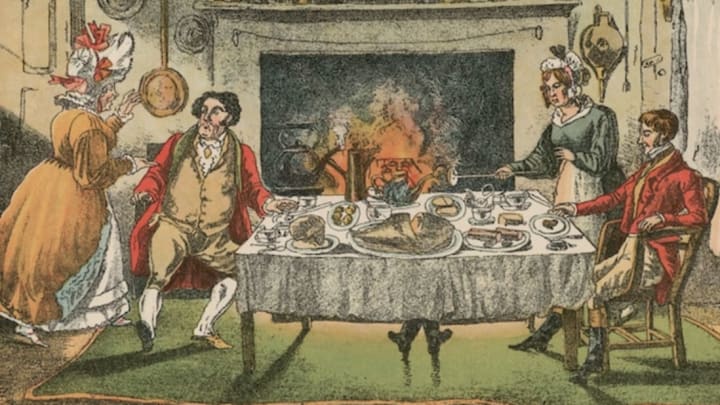Breakfast is tricky. Trying to find something that's the right balance of healthy, palatable, and portable when you'd rather still be asleep is no mean feat. And your high-society forefathers and mothers get it, too. Or at least, they had their own problems to deal with when it came to serving up the most important meal of the day. Even though many books on the subject made reference to the comparatively lax nature of breakfast, etiquette texts were full of instructions for hostesses struggling with a "morning appetite, which is generally dull and void of taste," as one such manual put it.
1. Take off the top hat—you look ridiculous.
The dress suitable for a breakfast is ordinary morning style, though sometimes full evening dress for gentlemen is indulged in, but this is affected and out of taste.
—Hand-book of Official and Social Etiquette and Public Ceremonials at Washington, 1889
2. But that doesn't mean you should look like a slob.
No lady, even in her own home, will come down to breakfast in a dress in which she would be ashamed to be seen by a stranger: collars and cuffs should be clean and nice, the hair well dressed, and the morning gown carefully put on; then, whatever the materials, the wearer will look well and ladylike. Jewellery (sic) should not be worn in the early morning, with the exception of rings habitually worn; a brooch and ear-rings, which should not be of pearls or diamonds.
—Etiquette for Ladies and Gentlemen, 1876
3. It's good to be a lady.
Where men-servants are in attendance, it is not necessary that the gentlemen should wait upon the ladies; otherwise the laws of chivalry, on which modern politeness is based, require that the fair sex should have every want anticipated.
—The Hand-book of Etiquette, 1860
4. Variety is the socially necessary spice of breakfast.
Tea and coffee are both necessities at breakfast, and often chocolate and cocoa, brown and white bread, cream, milk (hot and cold), butter, jam, honey, marmalade, fancy bread and cakes, with muffins in the winter, are the usual viands provided in large country houses… On the other hand, in some houses breakfast is laid upon a large table, as dinner or luncheon would be served, and then it becomes a very stiff proceeding. A side table, well laden with cold meat, game (when in season), potted fish, ham, tongue, etc., should always be provided, and plenty of hot dishes, such as kedgeree, devilled-chicken, kidneys, eggs and bacon, broiled ham, cutlets, sausages, etc.
—Etiquette: What To Do, and How To Do It, 1885
5. Live a little—pour your own coffee.
It is rather pleasant to dismiss the servants and to wait on one’s self at breakfast.
—Etiquette, the American Code of Manners, 1884
6. Your flowers should have that perfectly undone, "I woke up like this" feel.
In the centre of the table there should be a vase of flowers; in summer a china bowl of fresh-gathered roses, or a bunch of wild flowers, is a pretty ornament; later in the year a deep plate filled with moss, and studded with asters, dahlias, or chrysanthemums, has a good effect; at other seasons a fresh green fern—anything which adds brightness and grace to the table, but at the same time is not stiff and formal. The arrangement of flowers for a breakfast table should never be so studied or formal as that for a dinner table, nor even as the drawing-room bouquets. They should possess the distinctive feature of elegant negligence and simplicity.
—Etiquette of Good Society, 1893
7. Shut up and eat.
The most quiet meal of the day is breakfast...Never find fault with your food...Do not be ashamed to eat all on your plate, if you can.
—Perfect Etiquette, Or, How to Behave in Society, 1877
8. Talk about your nighttime activities, but nothing personal.
Conversation at the breakfast table should be on pleasant topics, and may be in some measure personal, extending to inquiries as to one’s health, how the night was passed, etc., but should never become unpleasantly or pointedly personal.
—Breakfast, Dinner and Supper, 1884
9. Avoid these tips at your own risk.
The custom of swallowing a cup of coffee, and "snatching a bite," before going to business, and calling it breakfast, cannot be too strongly deprecated. It is doing much to lay the foundation for dyspepsia and nervousness, of which the world already has too much. Indeed, it may be said to not only lay the foundation for these diseases, but is contributing largely to their superstructure.
